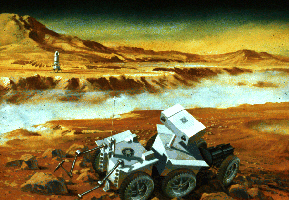




Do
we have a right to contaminate space with our biological material?
Does
it matter if we do?
What will be the consequences?
First, lessons from the past give sad and stark warnings of the consequences of the introduction of foreign biological elements to places where they have not previously lived.
|
The introduction of non-indigenous animals such as rabbits, into delicate habitats such as Australia, Madagascar and New Zealand, during the past three centuries, has led to the extinction of many unusual and fascinating local species. But we are not thinking of sending rabbits into space to eat rare space-grass, so where is the problem? This may be so, but other biological materials in the form of microbes could easily take a ride into space, unless we are careful to prevent contamination. In the past, micro-organisms have had extremely unpleasant consequences when introduced to new lands. When explorers from Europe reached the Americas in the sixteenth century, they not only brought with them the culture and religion of the Old World, they also brought the diseases. The peoples of the Americas had no immunity to many of these illnesses and populations were decimated in many places. In fact the entire native populations of some islands in the West Indies died. Similar situations occurred in subsequent centuries, for instance in the Pacific, when Europeans arrived on the atolls of Hawaii, Samoa and the other island chains. The history of exploration is littered with the sad consequences of the introduction of new diseases. |
 |
Nearly everyone in the world has a reverence for life in all its forms, whatever religion they follow, or whether they follow any religion. We recognize not only the feelings and rights of other people, we also recognize the rights to life of other creatures and plants and even microbes. There is some self-interest in this, for we understand the interdependence of life forms upon each other. Our very survival depends, for example, on the continued existence of green plants to renew our oxygen supplies.
If we accept this tenet about respect for life and the environment on Earth we must surely apply it equally to space and all that we find there. In the same way that we preserve the habitats of rare frogs, we should be prepared to preserve the environments of other planets.
Now environment implies that something is living there. If nothing is living, is it an environment and does it matter what we do with it. Do we have the right to dig out the Moon for its minerals? What if we find subsurface microbes? Do they have a right to remain undisturbed?
|
© All images NASA, unless otherwise show Consider Mars. Mars could be colonized by the human race. It is technically possible with our present technology (given enough money). There may be microbial populations on Mars. If we go there we will certainly, sooner or later, release our own microbes into the wild martian environment. This will happen often, probably, and sooner or later one of our hardy, resourceful Earth microbes will adapt and flourish on Mars. It may compete with any martian life. It may destroy it. Would that be a sad thing? Who would care and would it matter? There is one reason we should be cautious about contaminating other planets and moons with Earth biology. If we do, then we may never be able to decide the origin of any living things we find on alien worlds, and that would be sad.
|
Astrobiology
Center for Theology and the Natural Sciences
Go
to
Home
| Space Station
| Mars | Rainforest
© 1999 Satellite Events Enterprises Inc.
